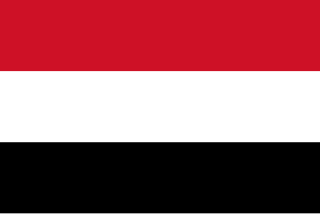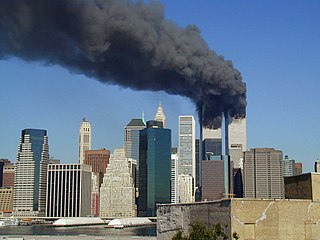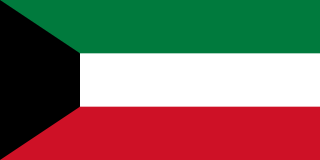Related Research Articles

Al-Qaeda, officially known as Qaedat al-Jihad, is a multinational militant Sunni Islamic extremist network composed of Salafist jihadists. It was founded in 1988 by Osama bin Laden, Abdullah Azzam, and several other Arab volunteers during the Soviet–Afghan War.

Muhammad ibn Abdullah was an Arab religious, social, and political leader and the founder of the world religion of Islam. According to Islamic doctrine, he was a prophet, divinely inspired to preach and confirm the monotheistic teachings of Adam, Abraham, Moses, Jesus, and other prophets. He is believed to be the final prophet of God in all the main branches of Islam, though the modern Ahmadiyya movement diverges from this belief. Muhammad united Arabia into a single Muslim polity, with the Quran as well as his teachings and practices forming the basis of Islamic religious belief.

Osama bin Mohammed bin Awad bin Laden, also transliterated as Usama bin Ladin, was a founder of the Pan-Islamic militant organization al-Qaeda. The group is designated as a terrorist group by the United Nations Security Council, the North Atlantic Treaty Organization (NATO), the European Union, and various countries. Under bin Laden's leadership, al-Qaeda was responsible for the September 11 attacks in the United States, and many other mass-casualty attacks worldwide.

Sunni Islam is the largest branch of Islam, followed by 85–90% of the world's Muslims. Its name comes from the word Sunnah, referring to the tradition of Muhammad. The differences between Sunni and Shia Muslims arose from a disagreement over the succession to Muhammad and subsequently acquired broader political significance, as well as theological and juridical dimensions. According to Sunni traditions, Muhammad left no successor and the participants of the Saqifah event appointed Abu Bakr as the next-in-line. This contrasts with the Shia view, which holds that Muhammad appointed his son-in-law and cousin Ali ibn Abi Talib as his successor.

Alfredo James Pacino is an American actor and filmmaker. Considered one of the most influential actors of the 20th century, he has received numerous accolades: including an Academy Award, two Tony Awards, and two Primetime Emmy Awards, making him one of the few performers to have achieved the Triple Crown of Acting. He has also been honored with the AFI Life Achievement Award, the Cecil B. DeMille Award, and the National Medal of Arts.

The United Arab Emirates, or simply the Emirates, is a country in Western Asia. It is located at the eastern end of the Arabian Peninsula and shares borders with Oman and Saudi Arabia, while having maritime borders in the Persian Gulf with Qatar and Iran. Abu Dhabi is the nation's capital, while Dubai, the most populous city, is an international hub.

Saudi Arabia, officially the Kingdom of Saudi Arabia (KSA), is a country on the Arabian Peninsula in Western Asia. It has a land area of about 2,150,000 km2 (830,000 sq mi), making it the fifth-largest country in Asia, the second-largest in the Arab world, and the largest in Western Asia. It is bordered by the Red Sea to the west; Jordan, Iraq, and Kuwait to the north; the Persian Gulf, Qatar and the United Arab Emirates to the east; Oman to the southeast; and Yemen to the south. Bahrain is an island country off the east coast. The Gulf of Aqaba in the northwest separates Saudi Arabia from Egypt. Saudi Arabia is the only country with a coastline along both the Red Sea and the Persian Gulf, and most of its terrain consists of arid desert, lowland, steppe, and mountains. Its capital and largest city is Riyadh. The country is home to Mecca and Medina, the two holiest cities in Islam.

Yemen, officially the Republic of Yemen, is a country in Western Asia, on the southern end of the Arabian Peninsula. It borders Saudi Arabia to the north and Oman to the northeast and shares maritime borders with Eritrea, Djibouti, and Somalia. It is the second-largest Arab sovereign state in the peninsula, occupying 555,000 square kilometres. The coastline stretches for about 2,000 kilometres. Yemen's constitutionally stated capital, and largest city, is the city of Sanaa. As of 2021, the population of the country is estimated at 30,491,000.

Sheikh Mohammed bin Rashid Al Maktoum is the vice president, prime minister, and minister of defence of the United Arab Emirates (UAE) as well as the ruler of Dubai. He is the third son of Sheikh Rashid bin Saeed Al Maktoum, former vice president of the UAE and ruler of Dubai. Mohammed succeeded his brother Maktoum as vice president and ruler following the latter's death in 2006.

Sheikh Khalifa bin Zayed bin Sultan Al Nahyan was the second president of the United Arab Emirates and the ruler of Abu Dhabi, serving from November 2004 until his death in May 2022.

Contemporary climate change includes both global warming and its impacts on Earth's weather patterns. There have been previous periods of climate change, but the current changes are distinctly more rapid and not due to natural causes. Instead, they are caused by the emission of greenhouse gases, mostly carbon dioxide and methane. Burning fossil fuels for energy use creates most of these emissions. Certain agricultural practices, industrial processes, and forest loss are additional sources. Greenhouse gases are transparent to sunlight, allowing it through to heat the Earth's surface. When the Earth emits that heat as infrared radiation the gases absorb it, trapping the heat near the Earth's surface. As the planet heats up it causes changes like the loss of sunlight-reflecting snow cover, amplifying global warming.

The September 11 attacks, commonly known as 9/11, were a series of four coordinated suicide terrorist attacks carried out by the militant Islamic extremist network al-Qaeda against the United States. On the morning of Tuesday, September 11, 2001, nineteen terrorists hijacked four commercial airliners mid-flight while traveling from the northeastern U.S. to California. The attackers were organized into three groups of five members and one group of four, with each group including one designated flight-trained hijacker who took control of the aircraft. Their goal was to crash the planes into prominent American buildings, inflicting mass casualties and major structural damage. The hijackers successfully crashed the first two planes into the North and South Towers of the World Trade Center in New York City, and the third plane into the Pentagon in Arlington, Virginia. The fourth plane was intended to hit a federal government building in Washington, D.C., but instead crashed down in a field outside Shanksville, Pennsylvania following a passenger revolt that foiled the attack.

Islam is an Abrahamic, monotheistic religion centred primarily around the Quran, a religious text that is considered by Muslims to be the direct word of the God of Abraham as it was revealed to Muhammad, the main Islamic prophet. It is the world's second-largest religion with more than two billion followers, comprising more than 25 percent of the global population. Islam teaches that God is merciful, all-powerful, and unique, and has guided humanity through various prophets, revealed scriptures, and natural signs, with the Quran serving as the final, universal revelation and Muhammad serving as the "Seal of the Prophets". The teachings and practices of Muhammad (sunnah) documented in traditional collected accounts (hadith) provide a secondary constitutional model for Muslims to follow after the Quran.

Kuwait, officially the State of Kuwait, is a country in Western Asia. It is situated in the northern edge of Eastern Arabia at the tip of the Persian Gulf, bordering Iraq to the north and Saudi Arabia to the south. Kuwait also shares maritime borders with Iran. Kuwait has a coastal length of approximately 500 km (311 mi). Most of the country's population reside in the urban agglomeration of the capital city Kuwait City. As of 2022, Kuwait has a population of 4.67 million people of which 1.85 million are Kuwaiti citizens while the remaining 2.8 million are foreign nationals from over 100 countries.

Islamic State (IS), also known as the Islamic State of Iraq and the Levant, Islamic State of Iraq and Syria, and by its Arabic acronym Daesh, is a militant Islamist group and former unrecognized quasi-state that follows the Salafi jihadist branch of Sunni Islam. It was founded by Abu Musab al-Zarqawi in 1999 and gained global prominence in 2014, when it drove Iraqi security forces out of key cities during the Anbar campaign, which was followed by its capture of Mosul and the Sinjar massacre.

The 2022 FIFA World Cup is scheduled to be the 22nd running of the FIFA World Cup competition, the quadrennial international men's football championship contested by the senior national teams of the member associations of FIFA. It is scheduled to take place in Qatar from 21 November to 18 December 2022. This will be the first World Cup ever to be held in the Arab world, and it will be the second World Cup held entirely in Asia after the 2002 tournament was held in South Korea and Japan. In addition, the tournament will be the last to involve 32 teams, with an increase to 48 teams scheduled for the 2026 tournament in the United States, Mexico, and Canada. Due to Qatar's intense summer heat, this World Cup will be held from late-November to mid-December, making it the first tournament not to be held in May, June, or July; it is to be played in a reduced timeframe of around 28 days. The first match played at the tournament will be contested between Senegal and the Netherlands at Al Thumama Stadium, Doha. The final is due to be held on 18 December 2022, which is also Qatar National Day. The reigning World Cup champions are France.

Bahrain, officially the Kingdom of Bahrain, is an island country in Western Asia. It is situated on the Persian Gulf, and comprises a small archipelago made up of 50 natural islands and an additional 33 artificial islands, centered on Bahrain Island which makes up around 83 percent of the country's landmass. Bahrain is situated between Qatar and the northeastern coast of Saudi Arabia, to which it is connected by the King Fahd Causeway. According to the 2020 census, the country's population numbers 1,501,635, of which 712,362 are Bahraini nationals. Bahrain spans some 760 square kilometres (290 sq mi), and is the third-smallest nation in Asia after the Maldives and Singapore. The capital and largest city is Manama.

Alfred Matthew "Weird Al" Yankovic is an American singer, musician, and actor who is known for humorous songs that make light of pop culture and often parody specific songs by contemporary musical acts. He also performs original songs that are style pastiches of the work of other acts, as well as polka medleys of several popular songs, most of which feature his trademark accordion.

On 26 March 2015, Saudi Arabia, leading a coalition of nine countries from West Asia and North Africa, launched an intervention in the Yemeni Civil War in response to calls from the president of Yemen Abdrabbuh Mansur Hadi for military support after he was ousted by the Houthi movement. The conflict ignited between the government forces, the Houthi rebels and other armed groups after the draft constitution and power-sharing arrangements collapsed, despite progress in the political transition led by the United Nations at that time, leading to an escalation of violence in mid-2014. The Houthis and allied units of the armed forces seized control of Sana’a and other parts of the country in September 2014 and in the following months. This prompted President Hadi to ask Saudi Arabia to intervene against the Iranian-backed Houthis.
Al Jazeera is the state-owned Arabic-language international radio broadcaster of Qatar. It is based in Doha and operated by the media conglomerate Al Jazeera Media Network. The flagship of the network, its station identification, is Al Jazeera.
References
- ↑ Schechter, Solomon et al. "Medicine". Jewish Encyclopedia Funk and Wagnalls, 1901-1906.